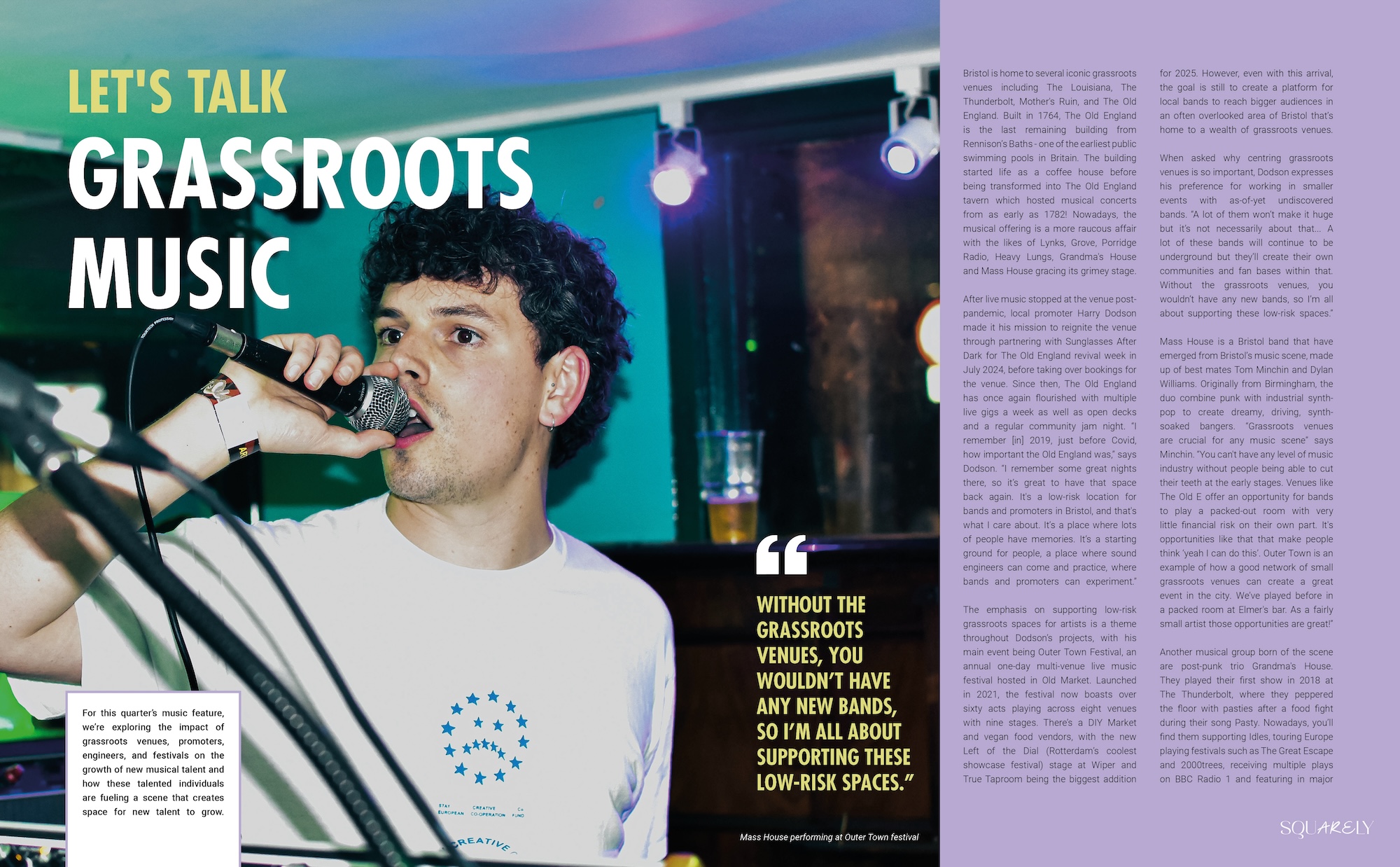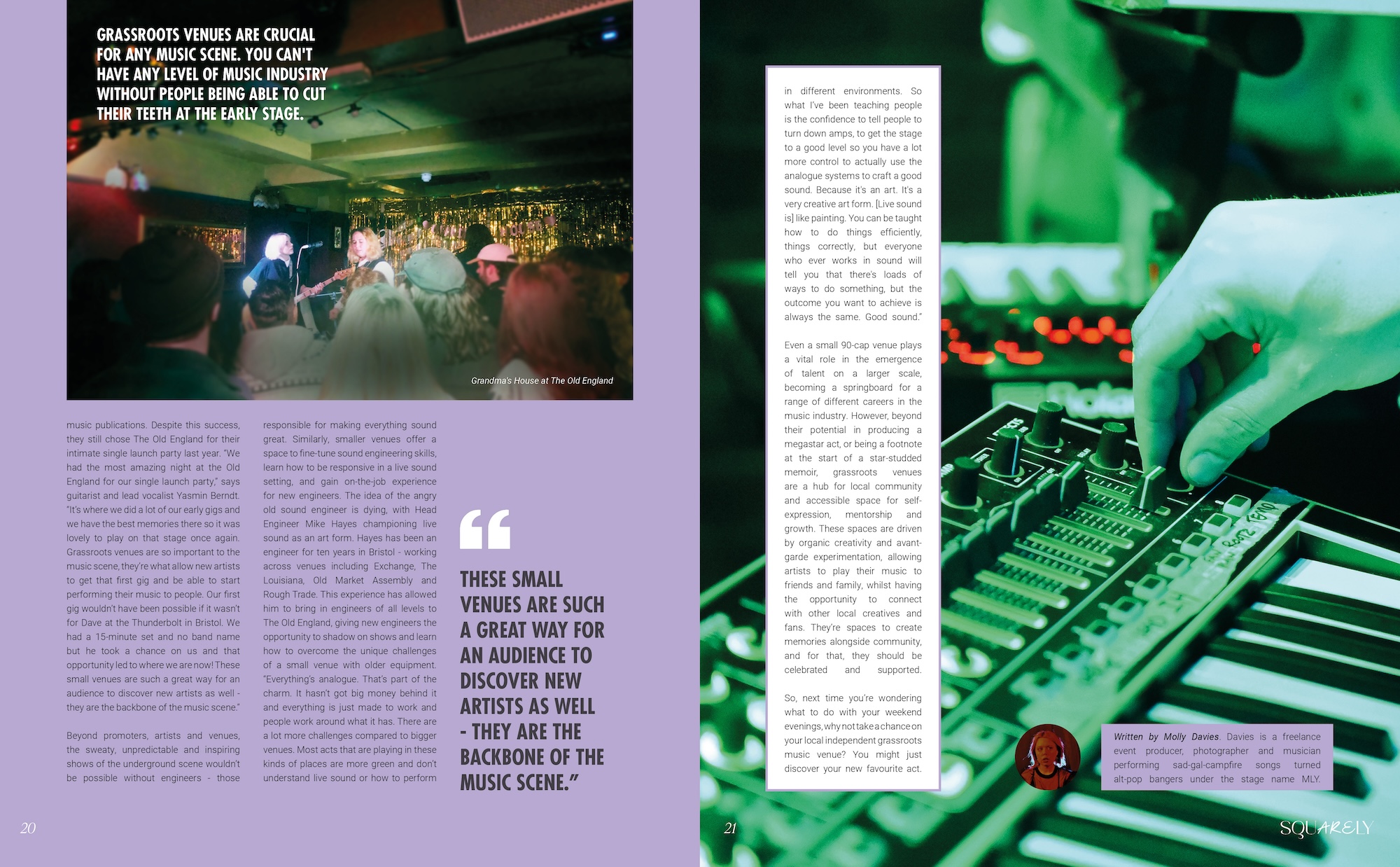by Molly Davies
Let’s talk grassroots music.
For this quarter’s music feature, we’re exploring the impact of grassroots venues, promoters, engineers, and festivals on the growth of new musical talent and how these talented individuals are fueling a scene that creates space for new talent to grow.
Bristol is home to several iconic grassroots venues including The Louisiana, The Thunderbolt, Mother’s Ruin, and The Old England. Built in 1764, The Old England is the last remaining building from Rennison’s Baths – one of the earliest public swimming pools in Britain. The building started life as a coffee house before being transformed into The Old England tavern which hosted musical concerts from as early as 1782! Nowadays, the musical offering is a more raucous affair with the likes of Lynks, Grove, Porridge Radio, Heavy Lungs, Grandma’s House and Mass House gracing its grimey stage.
After live music stopped at the venue post-pandemic, local promoter Harry Dodson made it his mission to reignite the venue through partnering with Sunglasses After Dark for The Old England revival week in July 2024, before taking over bookings for the venue. Since then, The Old England has once again flourished with multiple live gigs a week as well as open decks and a regular community jam night. “I remember [in] 2019, just before Covid, how important the Old England was,” says Dodson. “I remember some great nights there, so it’s great to have that space back again. It’s a low-risk location for bands and promoters in Bristol, and that’s what I care about. It’s a place where lots of people have memories. It’s a starting ground for people, a place where sound engineers can come and practice, where bands and promoters can experiment.”
The emphasis on supporting low-risk grassroots spaces for artists is a theme throughout Dodson’s projects, with his main event being Outer Town Festival, an annual one-day multi-venue live music festival hosted in Old Market. Launched in 2021, the festival now boasts over sixty acts playing across eight venues with nine stages. There’s a DIY Market and vegan food vendors, with the new Left of the Dial (Rotterdam’s coolest showcase festival) stage at Wiper and True Taproom being the biggest addition for 2025. However, even with this arrival, the goal is still to create a platform for local bands to reach bigger audiences in an often overlooked area of Bristol that’s home to a wealth of grassroots venues.
When asked why centring grassroots venues is so important, Dodson expresses his preference for working in smaller events with as-of-yet undiscovered bands. “A lot of them won’t make it huge but it’s not necessarily about that… A lot of these bands will continue to be underground but they’ll create their own communities and fan bases within that. Without the grassroots venues, you wouldn’t have any new bands, so I’m all about supporting these low-risk spaces.”
Mass House is a Bristol band that have emerged from Bristol’s music scene, made up of best mates Tom Minchin and Dylan Williams. Originally from Birmingham, the duo combine punk with industrial synth-pop to create dreamy, driving, synth-soaked bangers. “Grassroots venues are crucial for any music scene” says Minchin. “You can’t have any level of music industry without people being able to cut their teeth at the early stages. Venues like the Old E offer an opportunity for bands to play a packed-out room with very little financial risk on their own part. It’s opportunities like that that make people think ‘yeah I can do this’. Outer Town is an example of how a good network of small grassroots venues can create a great event in the city. We’ve played before in a packed room at Elmer’s bar. As a fairly small artist those opportunities are great!”
Another musical group born of the scene are post-punk trio Grandmas House. They played their first show in 2018 at The Thunderbolt, where they peppered the floor with pasty after a food fight during their song Pasty. Nowadays, you’ll find them supporting Idles, touring Europe playing festivals such as The Great Escape and 2000trees, receiving multiple plays on BBC Radio 1 and featuring in major music publications. Despite this success, they still chose The Old England for their intimate single launch party last year. “We had the most amazing night at the Old England for our single launch party,” says guitarist and lead vocalist Yasmin Berndt. “It’s where we did a lot of our early gigs and we have the best memories there so it was lovely to play on that stage once again. Grassroots venues are so important to the music scene, they’re what allow new artists to get that first gig and be able to start performing their music to people. Our first gig wouldn’t have been possible if it wasn’t for Dave at the Thunderbolt in Bristol. We had a 15-minute set and no band name but he took a chance on us and that opportunity led to where we are now! These small venues are such a great way for an audience to discover new artists as well – they are the backbone of the music scene.”
Beyond promoters, artists and venues, the sweaty, unpredictable and inspiring shows of the underground scene wouldn’t be possible without engineers – those responsible for making everything sound great. Similarly, smaller venues offer a space to fine-tune sound engineering skills, learn how to be responsive in a live sound setting, and gain on-the-job experience for new engineers. The idea of the angry old sound engineer is dying, with Head Engineer Mike Hayes championing live sound as an art form. Hayes has been an engineer for ten years in Bristol – working across venues including Exchange, The Louisiana, Old Market assembly and Rough Trade. This experience has allowed him to bring in engineers of all levels to The Old England, giving new engineers the opportunity to shadow on shows and learn how to overcome the unique challenges of a small venue with older equipment. “Everything’s analogue. That’s part of the charm. It hasn’t got big money behind it and everything is just made to work and people work around what it has. There are a lot more challenges compared to bigger venues. Most acts that are playing in these kinds of places are more green and don’t understand live sound or how to perform in different environments. So what I’ve been teaching people is the confidence to tell people to turn down amps, to get the stage to a good level so you have a lot more control to actually use the analogue systems to craft a good sound. Because it’s an art. It’s a very creative art form. [Live sound is] like painting. You can be taught how to do things efficiently, things correctly, but everyone who ever works in sound will tell you that there’s loads of ways to do something, but the outcome you want to achieve is always the same. Good sound.”
Even a small 90-cap venue plays a vital role in the emergence of talent on a larger scale, becoming a springboard for a range of different careers in the music industry. However, beyond their potential in producing a megastar act, or being a footnote at the start of a star-studded memoir, grassroots venues are a hub for local community and accessible space for self-expression, mentorship and growth. These spaces are driven by organic creativity and avant-garde experimentation, allowing artists to play their music to friends and family, whilst having the opportunity to connect with other local creatives and fans. They’re spaces to create memories alongside community, and for that, they should be celebrated and supported.
So, next time you’re wondering what to do with your weekend evenings, why not take a chance on your local independent grassroots music venue? You might just discover your new favourite act.




